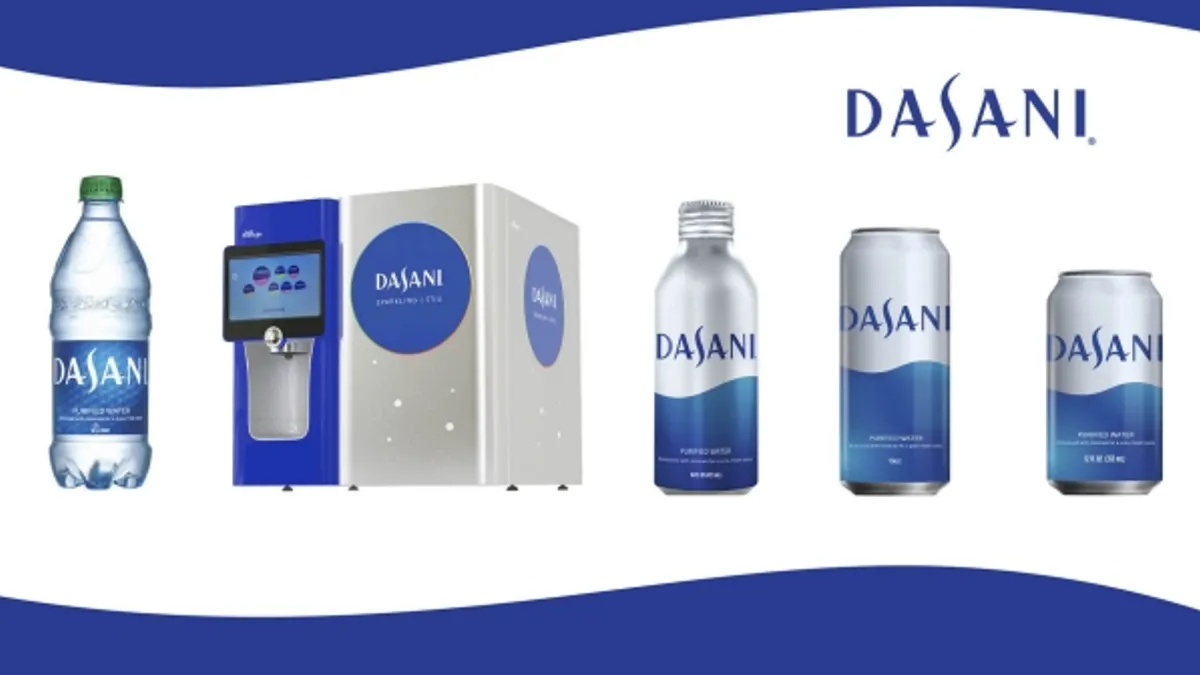Dive Brief:
- The Coca-Cola Co. is updating packaging for its Dasani water brand during the next year to help reduce plastic waste and encourage more recycled and renewable materials. The company said the move will ensure all Dasani bottles continue to be fully recyclable.
- A new 20-ounce HybridBottle will debut nationwide in mid-2020. It is made with up to 50% plant-based renewable and recycled PET plastic. Until then, bottles will use less new plastic. Aluminum cans for the water brand will launch in the Northeast this fall and expand to the rest of the country next year. Aluminum bottles will roll out by mid-2020, the company said.
- Coca-Cola said it will add about 100 more Dasani PureFill water dispensers nationwide this fall. The company will also add How2Recycle labels to all Dasani packages to encourage consumers to recycle.
Dive Insight:
Dasani is trying to boost its sustainability credentials with these moves into more recycled and renewable materials. Consumers are looking for more environmentally friendly practices from food and beverage manufacturers, so the brand may see increased sales with less new plastic in its containers and aluminum cans and bottles.
Lauren King, brand director for Dasani, said in a release these packaging upgrades will help accelerate Coca-Cola's "ambitious goals to significantly reduce packaging waste around the world by 2030," and represent the largest sustainability initiative in the brand's history.
In its release, Coca-Cola said Dasani "currently plans to remove the equivalent of 1 billion virgin PET bottles from its U.S. supply chain in the next five years and will continue to look to expand these efforts."
Coca-Cola was criticized last year by Greenpeace for what the environmental group considered an inadequate plan for addressing plastic pollution of the oceans. Greenpeace said Coca-Cola is the largest plastic bottle producer in the world and has "a special responsibility to lead the way in reduction of single-use plastic."
The group estimated Coca-Cola produces more than 110 billion single-use plastic bottles annually, with billions ending up in landfills, rivers and oceans. According to the New Plastics Economy initiative, Coca-Cola produces an estimated 3 million metric tons of packaging per year.
Besides the environmental aspects of this packaging change, Coca-Cola undoubtedly wants to enhance Dasani's revenue and keep up with PepsiCo, which recently announced it will package Aquafina water products in aluminum cans. In addition, PepsiCo said it will switch its bubly sparkling water brand from a mix of cans and plastic bottles to all cans and put its Lifewtr products in 100% recycled plastic by the end of 2020.
It's not just the water packaging that Coca-Cola and Pepsi are changing. Both companies plan to withdraw membership in the Plastics Industry Association this year due to disagreements with the trade association's policy and advocacy work. It's likely that pressure from consumers and competitors also played a role in their decision.
Aluminum seems to be enjoying a resurgence when it comes to water product packaging. Vita Coco's parent company, All Market, is also using aluminum for its new premium water brand, Ever & Ever.
While sales of packaged water products continue to rise — U.S. consumption climbed 284% between 1994 and 2017 and about 600 million households globally consumed bottled water in 2018 — consumers are also turning to products in paper cartons. Some of these companies include Just Water, Boxed Water is Better, Icebox Water and Rethink Water.
But sustainable packaging is just a piece of the challenge water manufacturers face. CNN noted sales could take a hit if consumers decide to ditch packaged water altogether and drink tap water from refillable bottles instead.














